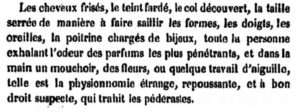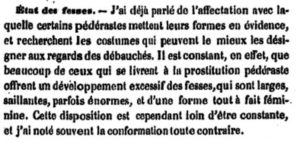>> Egyptian Doctors Think This Torturous Exam Can Detect “Chronic Homosexuals”
Le 15 février, veille de la vente des 24 avions Rafale (entre autres) de la France à l’Egypte, un jeune Egyptien tentait de se suicider en s’immolant par le feu. L’individu faisait partie des 26 personnes arrêtées par la police (et acquittées depuis, le 12 janvier) lors de la rafle, fin 2014, dans un hammam du Caire soupçonné d’être un lieu de rencontre homosexuelles.
L’opération policière avait été orchestrée par Mona Iraqi, une «journaliste» de la chaîne de télévision privée Al Kahera Wal Nas, et entendait démontrer l’action du régime ultra-conservateur à la tête du pays. Si l’homosexualité n’est théoriquement pas illégale en Egypte – la plupart des prévenus de cette affaire étaient ainsi accusés de «débauche et d’attentat à la pudeur» – plusieurs condamnations visant des gays ont été prononcées ces dernières années.
[spacer]
[spacer]
Ce dramatique rebondissement est intervenu quelques heures avant la publication d’une enquête de Buzzfeed sur les étranges méthodes de «détection» de l’homosexualité des médecins égyptiens chargés d’examiner les hommes arrêtés. Pour «distinguer» un homosexuel, le docteur Maged Louis indique par exemple, et le plus sérieusement du monde, que «la forme de l’anus va changer, devenant anormale et similaire à celle d’un vagin». Ce directeur adjoint de l’autorité médico-légale liée au ministère de la Justice livre d’autres observations physiologiques saugrenues, et se justifie en déclarant : «Tout ce que je dis relève de la science et est écrit dans des livres, les médecins du monde entier le savent bien.»
 L’un des ouvrages en question, cité par le prédécesseur de Maged Louis dans une interview de 2003 à Human Rights Watch, vient d’ailleurs de France. Publiée pour la première fois en 1857, cette Étude médico-légale sur les attentats aux mœurs est signée Auguste Ambroise Tardieu, homophobe notoire capable d’écrire «scientifiquement» des insanités comme signes tangibles d’homosexualité :
L’un des ouvrages en question, cité par le prédécesseur de Maged Louis dans une interview de 2003 à Human Rights Watch, vient d’ailleurs de France. Publiée pour la première fois en 1857, cette Étude médico-légale sur les attentats aux mœurs est signée Auguste Ambroise Tardieu, homophobe notoire capable d’écrire «scientifiquement» des insanités comme signes tangibles d’homosexualité :
«Les cheveux frisés, le teint fardé, le col découvert, la taille serrée de manière à faire saillir les formes, les doigts, les oreilles, la poitrine chargés de bijoux, toute la personne exhalant l’odeur des parfums les plus pénétrants, et dans la main un mouchoir, des fleurs, ou quelque travail d’aiguille, telle est la physionomie étrange, repoussante, et à bon droit suspecte, qui trahit les pédérastes.»
Juste après cet hallucinant passage, il poursuit : «Un trait non moins caractéristique, et que j’ai observé cent fois, c’est le contraste de cette fausse élégance et de ce culte extérieur de la personne avec une malpropreté sordide qui suffirait à elle seule pour éloigner de ces misérables.»
 La troisième édition de son étude parue en 1859 (et dont la Bibliothèque nationale de France propose une archive en ligne) se penche longuement sur les supposées caractéristiques anales des homosexuels, non sans avoir livré au préalable cette puissante remarque :
La troisième édition de son étude parue en 1859 (et dont la Bibliothèque nationale de France propose une archive en ligne) se penche longuement sur les supposées caractéristiques anales des homosexuels, non sans avoir livré au préalable cette puissante remarque :
«J’ai déjà parlé de l’affection avec laquelle certains pédérastes mettent leurs formes en évidence, et recherchent les costumes qui peuvent le mieux les désigner aux regards des débauchés. Il est constant, en effet, que beaucoup de ceux qui se livrent à la prostitution pédéraste offrent un développent excessif des fesses, qui sont larges, saillantes, parfois énormes, et d’une forme tout à fait féminine. Cette disposition est cependant loin d’être constante, et j’ai noté souvent la conformation toute contraire.»
 Tardieu n’est bien sûr pas la seule «source» des médecins égyptiens
Tardieu n’est bien sûr pas la seule «source» des médecins égyptiens
Les propos relevés par Buzzfeed au Caire attestent bien d’une vision aussi rétrograde que médicalement incorrecte sur la question, allégrement contredite dans l’article par des experts occidentaux interrogés et assez stupéfaits. Paradoxalement, et malgré la violence des tests infligés par les médecins missionnés par l’Etat, certains accusés égyptiens (et leurs avocats) restent malgré tout persuadés du bien-fondé de ces méthodes d’un autre âge.
Mohamed Abo Zakry est un des avocats de la défense dans l’affaire de la rafle du hammam représentant 7 des prévenus. Interrogé par Buzzfeed peu avant l’acquittement de ses clients, il déclarait : «On ne peut pas dire que ces examens sont incorrects. Ils sont corrects. N’importe quel docteur expérimenté peut clairement dire si un homme est gay ou pas.»
Depuis l’arrivée à la présidence de Abdel Fattah al-Sissi en mai 2014, le climat anti-gay en Egypte s’est accru, et au moins 150 personnes soupçonnées d’être homosexuelles ont été arrêtées dans le pays en 2014. Si le récent acquittement dans l’affaire du hammam a été perçu par beaucoup comme une avancée, personne n’est dupe. Interrogée par l’AFP en janvier dernier, Bouthaina Halim, lesbienne de 34 ans, déclarait que la décision de la justice n’était pas «une victoire pour la liberté de choix de l’orientation sexuelle, que l’Etat et les médias continueront de criminaliser et de persécuter».
Alexandre Hervaud revient sur son article, au micro de Zoé Baldy
[spacer]
>> When asked to explain what Cairo’s medical inspectors look for when they examine someone who’s been arrested for homosexuality, Dr. Maged Louis picked up a pen and started sketching an oval with sharp points on both ends.
“The shape of the hole will change,” he said. The anus “won’t be normal any more and will look like the female vagina.”
More than 150 people have been arrested on charges of homosexuality since President Abdel Fattah el-Sisi took power just under two years ago, the largest roundup of alleged LGBT people in more than a decade in Egypt. Anal exams are a routine part of the investigation in such cases, and Louis has a role in overseeing all of them. He is the deputy director of the Justice Ministry’s Forensic Medical Authority, as well as the chief of forensic medicine for the Cairo police district.
“First we make them take the prostrate position — the position that Muslims take when they pray,” he said in an interview with BuzzFeed News. The tests are intended not just to determine whether someone has ever had anal sex, but also to detect “chronic homosexuals,” because the letter of Egyptian law only criminalizes men who engage in “habitual debauchery.” Louis said that he believed that in addition to their elongation, the anuses of “chronic homosexuals” also don’t clench when touched or don’t contract as tightly. They are smooth and lack the “corrugations” — wrinkles — found on “normal” anuses, he said. And though he denied that examiners penetrate subjects under examination, he also said they can detect a “chronic homosexual” if his anus can accept larger objects.
“A normal man’s anus can’t take more than one joint of the small finger,” he said.
International human rights and medical experts dismissed Louis’s checklist as having “no medical basis” and being “categorically not true.” Most of those interviewed by BuzzFeed News couldn’t contain their shock before all of the criteria were listed.
“I think you heard my laugh — I think that says it all,” said Dr. Joel Palefsky, a professor at the University of California San Francisco specializing in anal cancer who is president of the International Anal Neoplasia Society. “We run a clinic where we do anal examinations of thousands of patients … Never in my 20 years of doing this have I seen an anus that looks like a vagina.”
Human Rights Watch and other advocacy organizations have long denounced such anal exams — which are routine in several of the world’s roughly 80 countries that criminalize sodomy — as a form of torture that violates international law. Medical leaders in some of the countries where these exams are used have called for their abolition, such as in Lebanon.
But Louis was incredulous that anyone could doubt his inspectors’ work.
“All of what I said is science and written in books,” he said. “Doctors all over the world know that.”
The idea that inspectors are intentionally fabricating evidence because of their own homophobia isn’t what makes these exams so disturbing — though that does sometimes happen, according to defendants’ accounts. It’s that beliefs about homosexuality are leading doctors — some of whom have done extensive (and horrific) research into perfecting diagnostic techniques — to believe that what they are doing is science.
One of the modern pioneers in anal examinations in Egypt was Dr. Aymen Fouda, Louis’ predecessor as deputy director of the Forensic Medical Authority, who went on to become chief medical inspector from 2005 through 2007.
During a 2003 interview with Scott Long, then-director of Human Rights Watch’s LGBT program, Fouda said the exams were based on techniques developed in Europe.
“In this kind of investigation there are six criteria which were established by the celebrated Frenchman [Auguste Ambroise] Tardieu,” Fouda said, referring to the 19th-century forensic doctor who published a book in 1857 called The Forensic Study of Assaults against Decency. In the book, Tardieu spelled out six “characteristic signs” of “habitual pederasty,” which included those described by Dr. Louis as well as sores and fissures. But, he wrote, “[t]he unique sign and the only unequivocal mark of pederasty” is an “infundibuliform” — or funnel-shaped — anus.
Fouda told Long that forensic experts were working on developing “new, advanced methods” to detect homosexuality “involving the use of electricity.” Fouda had co-authored a 1998 study published in a journal published by the Egyptian Society of Forensic Medical Sciences that experimented with inserting hypodermic needles into the muscle of the anus in “unanesthetized humans” which claimed to demonstrate that gay men’s anuses conduct electricity at a different rate. Other researchers continued experimenting with related methods, including a doctoral student who defended a dissertation at Ain Shams University — one of Egypt’s most prestigious — in 2003 entitled “Medico-legal Assessment of the Anal Sphincter Functions in Sodomists.”
Tardieu’s theories were suspect in Europe even when they were first published, said Khaled Fahmy, a historian of Egyptian forensic medicine at the American University of Cairo who has studied its translation into Arabic.
“Even back then this is a highly ideological book,” he told BuzzFeed News, part of a “morals campaign” that was a response to events in Paris at the time. And he thought it “would be shocking” to the Egyptian public if it were widely known that courts were continuing to treat examinations as serious evidence that were based on science that was 150 years old.
But, he speculated, they endure in part because they reinforce certain basic notions about homosexuality that circulate in Egypt: that it is like a disease, usually passed on to children through sexual abuse.
“There is a belief that this abuse during childhood will leave a physical mark, and it leaves a mark on the anus,” he said. “We now have a homosexual body — not only a homosexual character which is a defective character, but it has physical traces that a forensic doctor can discern.”
And though these anal exams now seem laughable in Europe and the United States, the belief that a detectable physical basis for sexual orientation persists into the 21st century. In 2010, the Czech Republic announced that it would stop subjecting gay refugees to a practice called “phallometry” or “penile plethysmography” — which involves attaching a pressure-sensing device to the refugee’s penis while he is shown heterosexual pornography — after it was denounced as “degrading treatment” by the United Nations Refugee Agency.
The same belief for a measurable sign of homosexuality also lingers in the hunt for a “gay gene,” suggests Graeme Reid, the current head of Human Rights Watch’s LGBT program. Though the argument that homosexuality is determined by biology has been very effective for the LGBT rights movement in the U.S. and Europe, Reid said, efforts to isolate a “gay gene” are also based on a simplistic, “flawed cultural assumption” about the biological basis of sexuality.
“The idea that there is kind of one causation for sexuality seems absurd given what we know about the complexity of human sexuality,” Reid said.
Some defendants who have undergone anal exams in Egypt describe open cruelty on the part of the doctors. One of the defendants in Egypt’s largest homosexuality trials in recent history — the 2001 trial of 52 men that became known as the “Queen Boat” case — told Long of Human Rights Watch that the anal exam was one of the “two worst times in my life”; the other was when the judge sentenced him to two years in jail. “The doctors treated us like pigs,” said another quoted in Long’s report on the trial, and several noted that their degradation was compounded by the fact that they were forced to assume a sexually subservient position in front of women. Anal exams are far from the only intrusive practice that appears to be becoming more common in Sisi’s Egypt — “virginity tests” for women who are arrested are also making a comeback since the military reasserted control, and Sisi has personally defended the practice.
Fahmy said that some of the doctors “may” see themselves as administering a form of punishment through these exams. But he thinks in most cases, the doctors “would be thinking this is not torture; they’re not really humiliating them.” A man who has allowed another to penetrate him — which carries much greater stigma than doing the penetrating — has already lost his honor in the eyes of many Egyptians, and so these exams seem like nothing by comparison.
Doctors likely believe that “these are people who have forfeited their honor to begin with,” Fahmy said. “By being who they are, by being homosexual, they effectively have forfeited the constitutional protection that they are entitled to.”
Because these “examinations have no forensic or evidentiary value for consensual homosexual acts,” Human Rights Watch maintains that doctors who perform them violate the United Nations Principles of Medical Ethics, which says physicians should not “apply their knowledge and skills in order to assist in the interrogation of prisoners and detainees in a manner that may adversely affect [their] physical or mental health or condition.”
And there is no doubt that these exams are absurd, say doctors practicing in the United States. Dr. Ross Cranston, director of the Anal Dysplasia Clinic and Research Program in the University of Pittsburgh Division of Infectious Diseases, said not all gay men have anal sex regularly or at all, and that no credible study has ever shown any clear difference in things like muscle strength.
“I could not tell a gay anal canal from a straight anal canal,” Cranston said. “There’s no typical sign of the gay anal canal.”
Human Rights Watch’s Reid said the organization will begin a project this spring to document how common anal exams are and the role of medical practitioners in them. The organization has documented them in at least six countries in the course of investigating specific cases of abuse, but no comprehensive review has ever been done to establish how widespread they are. And it’s not clear, Reid said, whether “there’s a collaboration between medical examiners and police to deliberately subject people to humiliation and torture, or medical examiners genuinely believe that this has some kind of a medical basis.”
Anecdotal reports suggest there is a good deal of skepticism about anal exams even in countries with notoriously homophobic regimes. In Uganda, for example, anal exams are “the first line of investigation” when someone is arrested for homosexuality, said Adrian Jjuuko, director of the Human Rights Awareness and Promotion Forum, which often provides legal support in cases involving LGBT rights. A Ugandan man who was arrested for homosexuality along with two others in November told BuzzFeed News that police stuck their hands down their pants when they were first detained to “see if we had Pampers,” believing “gays put diapers on themselves” because anal sex causes incontinence.
But despite the police’s fixation on the anus, Jjuuko said, “the state does not use [anal exams] as evidence.”
The amount of research Egypt’s forensic experts appear to have invested in anal exams would seem to set them apart. It’s not clear whether the doctors who perform the exams have the same rigor — Long collected reports from defendants in the 2001 case who said investigators reached their conclusions based on the fact that they appeared feminine or had no hair on their chests.
Belief in the scientific rigor of anal exams is widely shared in Egypt. Medical examiners aren’t just a tool the police use to simply rubber-stamp charges — in fact, they’ve contradicted the charges in Egypt’s two most high-profile homosexuality trials under Sisi’s regime.
During the trial last month of 26 men accused of participating in a “gay sex party” at a working-class bathhouse, it wasn’t prosecutors who introduced the results of the anal exams, but the defense. Prosecutors didn’t introduce them because only three of the men were found to have been sexually “used,” contradicting the testimony of the arresting officer, who claimed to have personally witnessed multiple couples engaged in anal sex.
All 26 men were acquitted in January, the first time defendants had been acquitted on charges of homosexuality in a high-profile case since Sisi began controlling Egypt. But an exam pronouncing a defendant’s anus “un-used” is not a guarantee of acquittal. Examiners routinely add a disclaimer to reports when they find no evidence of penetration that says anal sex can be undetectable if it happens with “full consent, taking the right position, and the use of lubricants.” And in another recent case — in which eight men were prosecuted based on a YouTube video prosecutors alleged was of a same-sex wedding — all were sentenced to a year in jail despite the fact that medical examiners said there was no evidence of penetration.
Even some Egyptian lawyers who support LGBT rights don’t question the legitimacy of the exams.
In some cases, attorneys even demand police send their clients for forensic exams in the hopes that it will refute the charges. Mohamed Abo Zakry, a defense attorney with an organization representing seven of the defendants in the bathhouse case, reacted as if it were a stupid question when asked about challenging the legitimacy of the tests during an interview with BuzzFeed News just before the acquittal in January.
“We cannot say the exams are not accurate,” Zakry said. “They are accurate. Any [doctor] who has experience can see clearly if this guy is gay or not.”


















